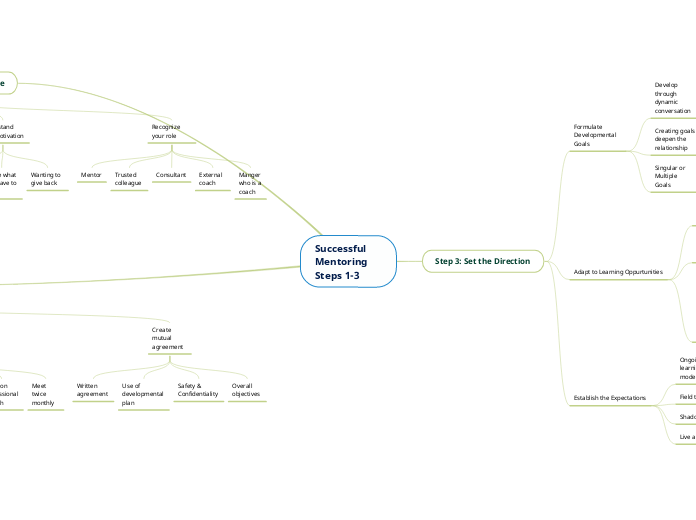Successful Mentoring Steps 1-3
Step 3: Set the Direction
Formulate Developmental Goals
Develop through dynamic conversation
Creating goals will deepen the relationship
Singular or Multiple Goals
Adapt to Learning Oppurtunities
Adjust, tailor, shape
Consider other angls
Embrace that you can not expect the mentee to absorb useful growth options at work
Establish the Expectations
Ongoing learning mode
Field test
Shadow
Live action
Step 1: Prepare Your Role
Use the 7 guiding principles of Successful Mentors
1. Start where your mentee is
2. Create a conventional safety space
3. Cultivate a positive & resilient relationship
4. Be flexibly goal oriented
5. Drive a risk taking for new mindsets & behaviors
6. Explore the internal world as a driver for external actions
7. Bring your best self
Understand your motivation
Your attraction
Share what you have to offer
Wanting to give back
Recognize your role
Mentor
Trusted colleague
Consultant
External coach
Manger who is a coach
Step 2: Establish the Relationship
Gain Understanding of Partner
Resume
Ask why
Social media
Find common ground
Favorite college experience
Preferred work habits
Memorable team events
Early work experiences
Prepare for the "what"
What brought you into the mentoring program
What would you like to learn during this mentorship
What stood out to you from previous mentoring
Identify your roles
Conduct early conversation
push the envelope
Demonstrate commitment
focus on professional growth
Meet twice monthly
Create mutual agreement
Written agreement
Use of developmental plan
Safety & Confidentiality
Overall objectives
